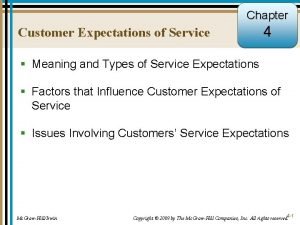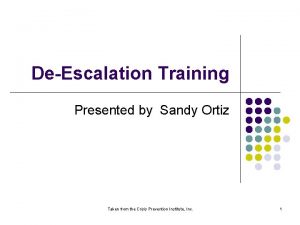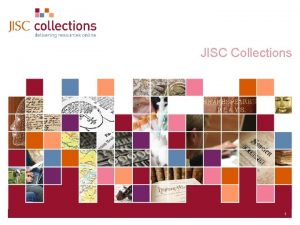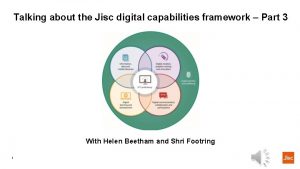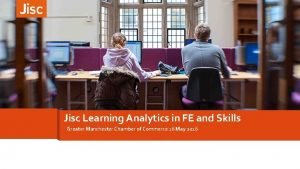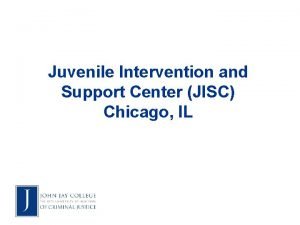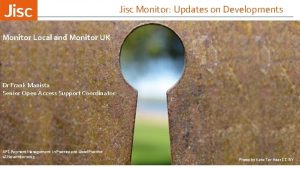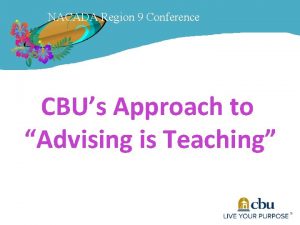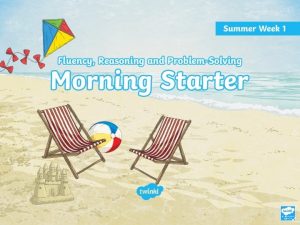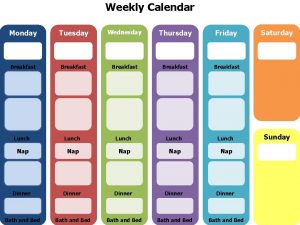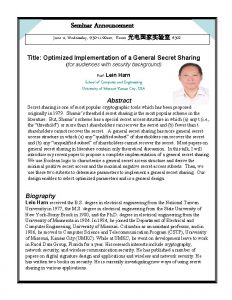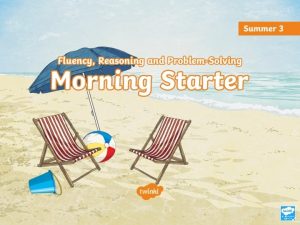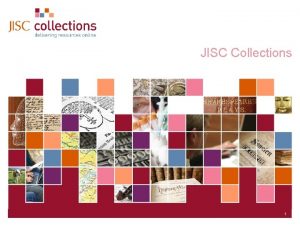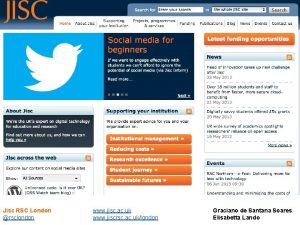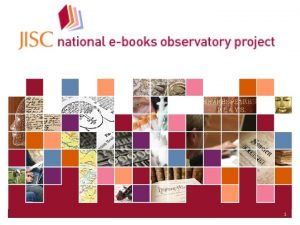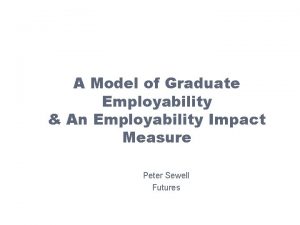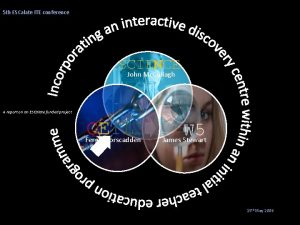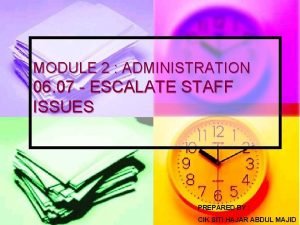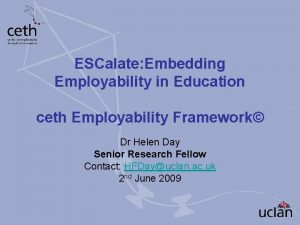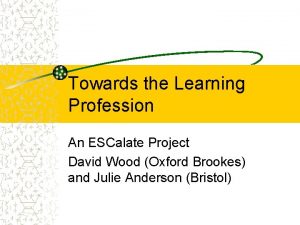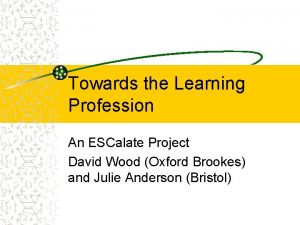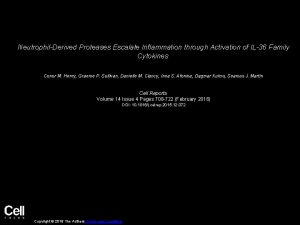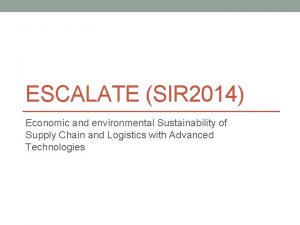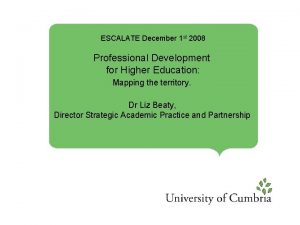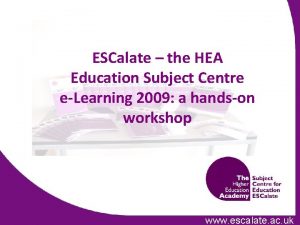Northern Regional College ESCalate JISC Conference Wednesday 26






















![Quality Improvement Unit [QIU]~ Head of Quality Improvement. Continuous Professional Development Manager. Quality Assurance Quality Improvement Unit [QIU]~ Head of Quality Improvement. Continuous Professional Development Manager. Quality Assurance](https://slidetodoc.com/presentation_image/2f3fb13ac7d6fb89bdb6341932627b33/image-23.jpg)




















- Slides: 43

Northern Regional College ESCalate - JISC Conference Wednesday 26 May 2010

Dr Catherine O’Mullan Deputy Director Support and Development and Mrs Suzanne Kennedy Head of Quality Improvement

FE Sector NI

NORTHERN REGIONAL COLLEGE – September 2007 Main Heading • Bullet Point 1 • Bullet Point 2 • Bullet Point 3 • Bullet Point 4 • Bullet Point 5

DEL Key Strategies of FE Sector NI FE Means Business • A key driver of local, sub-regional and regional economic and workforce development – The Primary Strategic Objective • An active agent of social cohesion • A major promoter of lifelong learning • Skills Agenda/14 -19 Agenda • Success through Excellence

Magherafelt

Ballymena Farm Lodge Centre of Excellence Construction and Engineering Toyota Academy

Ballymena Trostan Avenue

Ballymena Café Lamont

Newtownabbey Transport Skills Centre

Coleraine

The Aspiration 4 Campus Model

Estates Rationale • Quality of student experience • Optimum number of Campuses • Strategically positioned within our region • Quality accommodation: fit-for-purpose • Concentration of investment in specialist equipment • Maximise the use of available resources

NRC Characteristics • 9 campuses • £ 32 million turnover • 1200 staff • @ 24, 550 enrolments: • 4500 full-time 20000 part-time

09/10 Further Education 13, 572 Higher Education 1, 062 Training 2, 048 Entitlement Framework 2, 803 Essential Skills 5, 072 Total 24, 557

Types of provision at NRC • Apprenticeships. NI/Training for Success Training Contract @ £ 4. 5 m • Further & Higher Education/Essential Skills FLU funded • Entitlement Framework @ 1. 5 m • Cost recovery Specialist provision for employers to meet their needs – bespoke training/externally funded projects @ £ 0. 5 m-£ 1. 5 m

Restructuring Process Executive Management Team Director Deputy Director Curriculum Deputy Director Support and Development Deputy Director Planning and Resources Director of Finance

Support and Development Deputy Director Student Services & Marketing Economic Engagement Quality Improvement

HE within NRC Historical Overview • Full-time and part-time provision in a range of vocational areas • HE - Level 4 and above • Full-time HE provision within FE from @ 1990 • HND Programmes/Awarding Bodies • Associate Status of University of Ulster • DEL funding Ma. SN allocation of f/t funded places across sector

HE within NRC 2009/10 • • Enrolments Year F/t 07/08 257 08/09 194 09/10 260 NRC Ma. SN = 249 P/t 781 802 Total 1038 996 1062

HE within NRC 2009/10 • HNDs - Business, Manufacturing/Electronic Engineering, Building Studies, Health & Social Care, Advanced Practice in Work with Children and Families, Computing with Multi Media • Level 4 Higher Professional Diploma in Early Years • Foundation Degree in Building Technology and Management • Foundation Degree in Sport Exercise & Fitness • Campus location/specialist resources • Planning process

HE within NRC 2009/10 • • Part-time HND (p/t) HNCs, Counselling provision (UU), ILM, IATA, C&G courses, Degree (UU) FD in Retail (p/t) – employer focus/UU FD – L&M development Local access; increased participation HE Graduations FE does not have Degree awarding powers
![Quality Improvement Unit QIU Head of Quality Improvement Continuous Professional Development Manager Quality Assurance Quality Improvement Unit [QIU]~ Head of Quality Improvement. Continuous Professional Development Manager. Quality Assurance](https://slidetodoc.com/presentation_image/2f3fb13ac7d6fb89bdb6341932627b33/image-23.jpg)
Quality Improvement Unit [QIU]~ Head of Quality Improvement. Continuous Professional Development Manager. Quality Assurance Manager.

Overarching Aims of the QIU~ • • • to lead the college as it strives for excellence to guide the college as it strives for an ethos and culture where, the central focus for all staff is the learner to assist build capacity within all staff so that they have the knowledge, skills and understanding to effectively contribute to the total student learning experience

Guiding Principle for the QIU ~ • Holistic approach to quality [Develop and support the continuous improvement of the quality of the entire student experience. ]

Case Study ~ My personal journey – – – Timeline Initial challenges Way forward Keys to Success Ongoing Challenges

Timeline ~ April 2008: Appointed as Head of Quality Improvement September 2008: QIU team in place May 2009: 1 st QAA Developmental Review May 2010: QAA Follow-up to Developmental Review

Initial Challenges ~ • Before quality improvement and enhancement we first had to develop robust quality assurance processes • Legacy Colleges all had different approaches to quality assurance • Due to range of provision [14 to 16; FE; Training; HE ~ full and part time] it was important to develop quality processes that were common across the provision

Initial Challenges ~ • Developing processes that would meet the requirements of a wide range of Awarding Bodies that the College works with • Developing processes that would fulfill the requirements of the Education and Training Inspectorate [Eti] • Meeting the requirements of the Quality Assurance Agency [QAA]

The Way Forward ~ • Development of clear strategies, e. g. – Quality Improvement Strategy – Retention Strategy – HE Strategy • Robust quality assurance policies and procedures, e. g. – Assessment – Appeals

The Way Forward ~ • Ensuring that the quality of learning and teaching is a key aspect of the work of the QIU – CPD focus on learning and teaching – ‘modeling’ good learning and teaching • Making use of the knowledge and expertise of other staff within the College • Building on previous experiences and relationships e. g. – Local university

The Way Forward ~ • Development of college wide Planning Cycle linked to; – Team based Self Evaluation Reports [SERs] • Curriculum and Support Services – Departmental Operational Plans – Overall College Development Plan and Whole College Quality Improvement Plan, Corporate Targets and KPIs

The Way Forward ~ • Quality Improvement Unit is a small unit only three staff hence it is really important to; – Establish ownership for ‘quality’ in all staff / teams across the College • Director and Executive Management Team totally committed to quality improvement; – They allow the QIU the freedom to develop!

The Way Forward ~ • Putting the learner at the centre of our service – Range of mechanisms to support the ‘student voice’ • Continuous Professional Development as part of QIU – Can have a real focus on the total student experience – Real focus on quality learning and teaching

Keys to Success~ • Building relationships – At individual and team level • being approachable, responsive, supportive • listening to ‘teams’ • Interacting with staff ~ ‘getting out and about’ • Being proactive – When asked a question, giving an answer – Teams now approach QIU for advice and help in problem solving

Keys to Success~ • Being happy with ‘small steps’ • Culture of being learner focused • Staff Intranet as the central repository for all documentation • Multidisciplinary teams – HE Committee • Remit sharing of good practice • Saying thank you

Keys to Success~ • Leading by example – Quality of documentation produced – Central role of the QIU in external inspections with Eti and QAA – Timely response to issues raised • Being creative and innovative • Viewing ‘areas for improvement’ in a positive light

Keys to Success~ • Interaction with curriculum managers • Interaction with support services – Student support, Admissions, Finance, Marketing etc • Being ‘passionate’ about improving quality • Asking for feedback

Ongoing Challenges ~ • Getting ‘buy in’ from all staff – Every little helps !! • Embedding of quality policies, procedures and processes – Takes a lot of time to ‘filter down’ • Acceptance of a standardised approach – QCF and QAA are really helping

Ongoing Challenges ~ • Moving from quality assurance to quality improvement and enhancement • Action planning resulting from external inspections – Making ‘action planning’, success and target focused – Instilling ownership for the ‘actions’

Ongoing Challenges ~ • Ensuring that processes within the College comply with the QAA Academic Infrastructure – In particular the 10 Codes of Practice • Developing an HE ethos • Closing the loop

Questions

Thank you
 Why did the arms race escalate during the cold war?
Why did the arms race escalate during the cold war? ç
ç Crisis development/behavior levels
Crisis development/behavior levels Jisc collections manager
Jisc collections manager Jisc glassdoor
Jisc glassdoor Jisc digital capabilities framework
Jisc digital capabilities framework Jisc learning analytics
Jisc learning analytics Jisc chicago
Jisc chicago Jisc monitor
Jisc monitor Jisc banding
Jisc banding Northern burlington school district
Northern burlington school district Niosh northern regional office (penang)
Niosh northern regional office (penang) Nacada region 9
Nacada region 9 Drttools
Drttools My favourite day is saturday
My favourite day is saturday Thursday prayer images
Thursday prayer images Wednesday or thursday
Wednesday or thursday Wednesday good morning
Wednesday good morning Wise wednesday
Wise wednesday Michelle hansberry
Michelle hansberry Wednesday at 6
Wednesday at 6 Borwick hall outdoor education centre
Borwick hall outdoor education centre Wednesday journal prompts
Wednesday journal prompts Marvelous monday terrific tuesday wonderful wednesday
Marvelous monday terrific tuesday wonderful wednesday Skinny wednesday
Skinny wednesday Wednesday evening prayer
Wednesday evening prayer Fe exam results wednesday
Fe exam results wednesday 1
1 Monday tuesday wednesday thursday friday calendar
Monday tuesday wednesday thursday friday calendar King forever
King forever Happy wednesday march
Happy wednesday march Wednesday diary
Wednesday diary Function of lipids
Function of lipids Happy wednesday
Happy wednesday Moday tuesday
Moday tuesday Pat winlink
Pat winlink Wednesday seminar
Wednesday seminar Wednesday phonics
Wednesday phonics Monday=621 tuesday=732 wednesday=933
Monday=621 tuesday=732 wednesday=933 Wednesday bell ringer
Wednesday bell ringer Monday tuesday wednesday thursday friday saturday sunday
Monday tuesday wednesday thursday friday saturday sunday Tuesday bell work
Tuesday bell work Good morning happy february
Good morning happy february Wednesday
Wednesday

